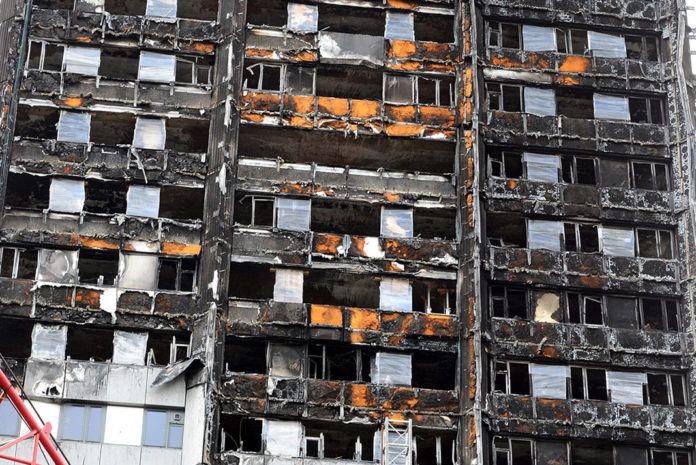This year’s annual Fire Summit, run by the Fire Protection Association, came at a crucial time. We are awaiting the government’s implementation plan for the Hackitt Review; the long-awaited review of Building Regulations is about to begin; the details of the combustibility ban will shortly be revealed; the first part of the Grenfell public enquiry is drawing to a close and we have the unknown implications of Brexit.
The Summit brought together the best in the business of the British fire industry, with over 150 delegates joining a panel of experts in a packed lecture theatre at the Institute of Civil Engineers.
A special session was run on Grenfell by Fire Protection Association’s (FPA) managing director, Jonathan O’Neill, and his colleagues, principal consultant Howard Passey and technical director, Dr Jim Glockling. Jonathan O’Neill discussed the background of the FPA’s attempts in the lead up to the fire to change government policy, with June 14, 2017 turning the ‘world upside down’. With no review of building regulations in 14 years, he shared the FPA and insurers’ own document that was created as a response.
He also addressed the work that the FPA had done to lobby government, such as the Safe Futures campaign of 2013, before discussing modern methods of construction (MMC) and their risks, specifically in terms of the use of combustible materials in increasing quantities within the structure, insulation, and cladding of buildings.
Howard Passey discussed competency, the responsible person, the role of the Regulatory Reform (Fire Safety) Order 2005 [FSO] in defining both elements, and the Hackitt Review’s recommendations on this, including the Joint Competency Authority (JCA). His view was that a “safety case will need to be produced”; that “layers of protection” through guidance would be required; and that the implementation and management of the JCA would be a ‘massive undertaking’.
Dr Jim Glockling reflected on the FPA and Association of British Insurer’s (ABI’s) testing programmes concerning cladding, sprinklers and detection, noting that the issues facing the sector “have been on the table for a very long time”, and that detection was “probably the easiest thing to solve”.
James Dalton, director of general insurance policy at the Association of British Insurers, said measures to ban combustible materials on the outside of some buildings in the wake of the Grenfell Tower Fire do not go far enough and that Grenfell was “predictable and preventable”. He continued that “combustible material does not belong on the buildings of vulnerable people” and believes in the mandatory use of sprinklers.
Roy Wilshire chairman of the National Fire Chief Council, spoke of the fire and rescue response post-Hackitt Review. Graham Watts from the Constructive Industry Council also spoke about the Hackitt Review saying when Dame Judith commented that the UK was “behind other parts of the world and lacked a coherent approach”, she was “being kind”. Mike Wood, independent consultant, joined the construction debate with a presentation on the importance of fire doors, commenting “as a developer I want to be able to sleep at night”.
The Brexit session was presented with an overwhelming air of uncertainty. Anthony Burd, head of the built environment at the British Standards Institute started by saying that “for us, it’s business as usual” as not much will be changing with standards, but as he believes firmly in continuity, if the Brexit negotiations result in a no deal, guidance on trade would be affected.
Paul Pope, director of the Fire Industry Association, believes that the fire industry effects are a risk to business, because “potential re-certification could happen” and this could affect orders dramatically, as 80% of global trade needs product certification. He commented that we “really don’t know what it means for us”, so we must prepare for the worst. Howard Passey, principal consultant at the FPA stated that at this stage “nobody knows” what the implications are, so it’s important that as laws could be changed “at a whim”, the fire industry must undertake “effective surveillance” on government changes. He urged the need to be vigilant.
Rounding off the day’s talks, FPA chair Chris Hanks stated that “Grenfell’s profound effect” was still being felt 18 months later and acknowledged that there were still challenges to face. He stated that it was both the FPA’s and the insurance market’s belief that current controls “are not working and are not fit for purpose”, so a culture change is needed. It is always the case that the sector finds things “are not right after a disaster”, and he asked “why does it take a tragedy to do that? These fires should simply not be happening”.




